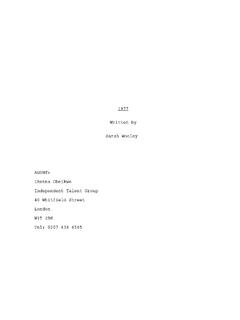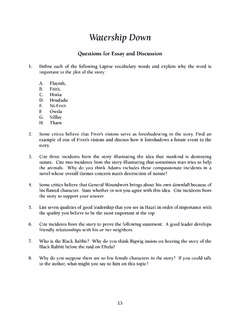Transcription of FOR IMMEDIATE RELEASE: Nick Harkin/Carly Leviton Carol …
1 FOR IMMEDIATE release : nick Harkin/Carly Leviton Carol Fox and Associates x 103/104 50 YEARS OF MEMORIES: HIGHLIGHTS FROM THE HISTORY OF THE CHICAGO INTERNATIONAL FILM FESTIVAL 1964 Michael Kutza, age 22, is determined that Chicago should be a home for the appreciation of international film. Legendary Chicago Sun-Times columnist Irv Kupcinet is an early supporter, and introduces him to the recently widowed silent screen comedienne Colleen Moore Hargrave, then living in Chicago, who opens many doors for Kutza among Hollywood elite and Chicago society. Kutza founds Cinema/Chicago, the organization that presents the Chicago International Film Festival.
2 1965 The first Chicago International Film Festival debuts at the original Carnegie Theatre at Rush & Oak Street on November 9. Eight films are shown in the feature category, chosen from more than 300 entries from 15 nations. Other categories included Religious Films, Experimental Films, Industrial Films, Short Subjects, Educational Films, Television Commercials, Documentaries and Cartoons. In its inaugural year, the Festival honors King Vidor in a ceremony attended by Bette Davis, and Stanley Kramer gives a public talk, offering advice to student filmmakers. The first Gold Hugo for feature film goes to The Lollipop Cover. Short films by the soon-to-be-legendary director William Friedkin are presented.
3 1966 In 1966, Kutza announces that the Festival is open to Adults Only to avoid having to obtain approval for his programming from the Chicago Censor Board, a civic group made up of policemen s widows that rated films for local audiences. The board is ultimately dissolved by the Supreme Court two years later. Harold Lloyd, Otto Preminger and silent film comedienne Colleen Moore Hargrave are celebrated at the Festival. 1967 The Festival presents I Call First (later renamed Who s That Knocking at My Door ), the first feature film by Martin Scorsese, starring Harvey Keitel. Scorcese s film is reviewed by Roger Ebert as one of his first assignments for the Chicago Sun-Times, who wrote that it made a stunning impact in its world premiere Wednesday night at the Chicago International Film Festival.
4 Honored that year are Busby Berkeley, George Cukor, Ruby Keeler, graphic designer and filmmaker Saul Bass, Pablo Ferro and animator Richard Williams. The year also sees the debut of the iconic eyes logo, a composite of close ups of silent screen sirens Theda Bara, Pola Negri and Mae Murray, designed by Kutza. 1968 Two short films by John Lennon and Yoko Ono, Two Virgins and No. 5, receive their world premieres at the Festival. The Festival pays tribute to Mervyn LeRoy and famed Canadian animator Norman McLaren. Winner of the Gold Hugo for Best Feature is Innocence Unprotected from Yugoslavian director Dusan Makavejev. 1969 The Festival debuts a New Directors series, as well as a Films for Children competition judged by children.
5 For the first time, the Festival receives public acknowledgement from Mayor Richard J. Daley. The Mayor had earlier told Kutza, The films you show could lose me votes! and had declined public support of Kutza s audacious, often experimental, programming, fearing it could prove a political liability, though the administration had quietly helped the Festival to secure hotel partners and theaters. The career of animator George Pal is celebrated. Belgian director Harry K mel is awarded the Best Feature Gold Hugo for Monsieur Hawarden. 1970 Illinois Governor Richard B. Ogilvie publically supports the Festival, writing, Too often, the avant-garde image of the filmmaker has been interpreted as antithetical to the mid-American ethic.
6 But that is a view which disregards an essential element of that ethic: its firm foundation in the concept of individual freedom. Film is free, as America is free. (15 years of grants from the State of Illinois follow.) The Festival features its first all-critics jury, with banter and barbs exchanged by the Chicago Sun-Times s Roger Ebert, the Chicago Tribune s Gene Siskel, Chicago Today s Mary Knoblauch and The Chicago Daily News Sam Lesner. Howard Hawks and George Stevens visit the Festival and discuss their work and influences. Celebrated documentarian Les Blank s short The Blues Accordin to Lightnin Hopkins takes home a Gold Hugo. 1971 Film Festival honorees include Sonja Henie, Hollywood director Franklin Schaffner and film/television producer Donald Siegel.
7 Polish director Krysztof Zanussi s Family Life and Claude Jutra s Mon Oncle Antoine are among the films that debut at the Festival, with Zanussi s film winning the Special Jury Prize and Jutra s taking home the Gold Hugo for Best Film. Jos Luis L pez V zquez wins the Best Actor award for The Ancines Woods. 1972 Grigory Kozintsev s King Lear, representing the USSR in the Festival, is among the notable films screened. Film festival honorees include renowned documentary director Frederick Wiseman, including a retrospective of his work, Abel Gance, Paul Morrissey and Linwood G. Dunn. For the second consecutive year, Jos Luis L pez V zquez is honored with a Best Actor Silver Hugo, this time for his performance in Mi Querida Se orita.
8 British director Mike Leigh s directorial debut Bleak Moments wins the Gold Hugo for Best Film. 1973 Film festival highlights include a complete retrospective of the work of Indian auteur Satyajit Ray and tributes to David L. Wolper and classic Warner Bros. musicals. Rainer Werner Fassbinder s The Bitter Tears of Petra Von Kant wins the Special Jury Prize. Greek master Theo Angelopolous s first feature Reconstruction is shown along with his Days of 36. 1974 Film Festival honorees include Robert Wise, Vincente Minnelli, Slovak film writer and director J n Kad r and Angela Lansbury. The Gold Hugo for Best Feature goes to Georgy Shengalaya s Prosmani from the USSR. The Clockmaker of St.
9 Paul, the feature debut of French filmmaker Bertrand Tavernier, also has its premiere at the festival. 1975 Milos Forman s One Flew over the Cuckoo s Nest has its world premiere at Opening Night of the Festival with Jack Nicholson and other cast members in attendance. A tribute to Pier Paolo Pasolini is planned, but the celebration becomes a memorial when the director is murdered the night before his departure for Chicago. Also honored is Stanley Donen. Notable screenings include Polish filmmaker Andrzej Wajda s Land of Promise, which takes home the Gold Hugo. 1976 Notable debuts include the cult-classic documentary Albert and David Maysles Grey Gardens and Wim Wender s Kings of the Road, which was awarded the Gold Hugo.
10 Native Chicagoan turned film star Charlton Heston and Metro Goldwyn Mayer Costume Designer Helen Rose are honored. 1977 The premiere of Peter Weir s Picnic at Hanging Rock and Sidney Lumet s Equus debut at the Festival. The Festival includes a retrospective of Mel Brooks films and tributes to Ann Miller, Lindsay Anderson, Krzysztof Zanussi and costume designer Edith Head. Celebrated Cuban auteur Tomas Gutierrez Alea s The Last Supper wins the Special Jury Prize. 1978 President Jimmy Carter offers the Festival his congratulations, and the Festival presents the world premiere of Martin Rosen s much anticipated animated watership down . That year, honorees included Orson Welles (who, unable to attend, creates a special short film for the occasion) and Mickey Mouse, who arrived from Hollywood via train and met with Chicago Mayor Michael Bilandic before a screening of clips from classic Disney animation.









